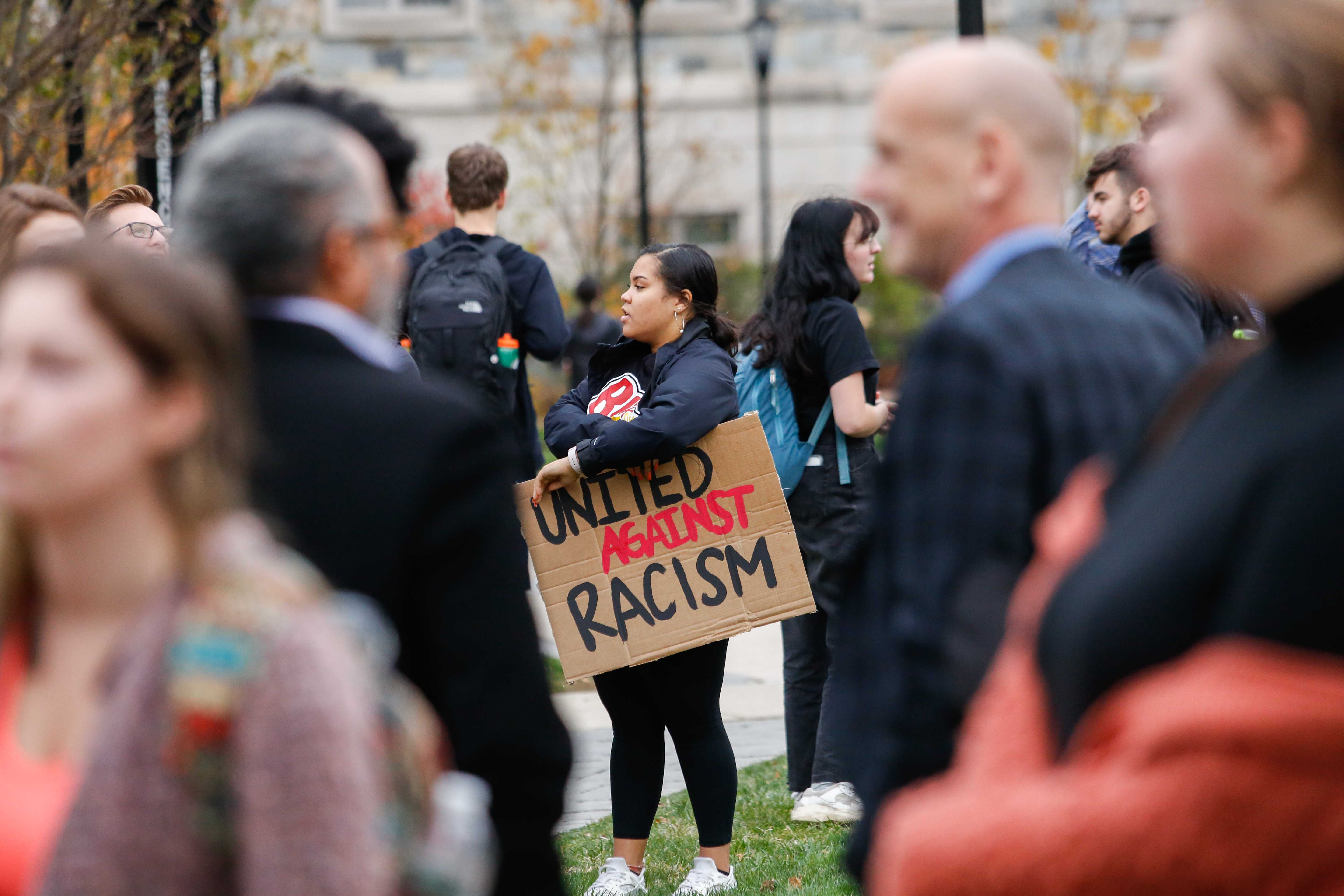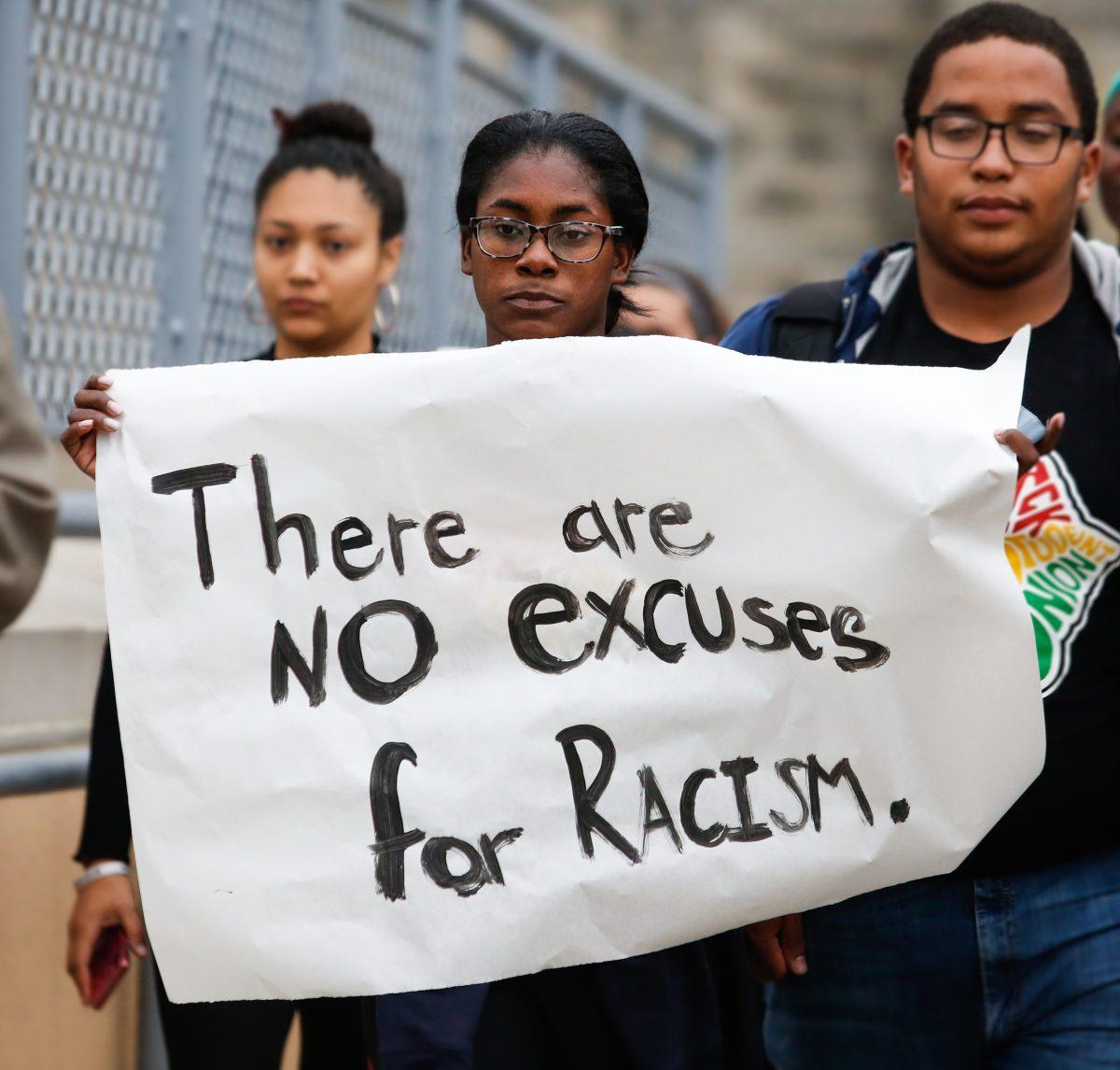A first-year student called a female African-American Public Safety officer the n-word some time on the morning of Oct. 24. In the evening on the same day, University President Mark C. Reed, Ed.D., sent an email to inform the St. Joe’s community.
The officer asked a group of students who were outside the Science Center to lower their voices. One student in the group yelled the n-word at the officer in response. The officer then filed a report with the Office of Public Safety and Security. All of the students received an interim suspension pending a hearing. The students “are not allowed on campus,” according to the email.
“The preliminary investigation and early reports indicated the conscious use of a universally recognized racist word,” Reed said in an email response to questions from The Hawk directed through the Office of Marketing and Communications. “A pattern of bias-related misconduct at the freshman level, in particular, was being seen early on in the semester, so I felt that it was important to express my continued frustration and re-communicate expectations.”
Some members of the St. Joe’s community said Reed’s email to students, faculty and staff was a better response to the incident compared to the university’s handling of past racial bias incidents.
“I think you see a firmer stance,” said Keith Brown, Ph.D., associate professor of sociology. “I like that Dr. Reed is very clear in calling this a racist comment.”
However, to Aisha Lockridge, Ph.D., associate professor of English and Faculty Senate president, an email was not enough.
“I think the email’s better than the last few emails, but I’m tired of getting emails because I don’t think that they’ve done anything about policy,” Lockridge said.
In the email, Reed said, “we are aware of three reported incidents so far this year.” According to Public Safety reports and The Hawk’s reporting, we have documented four racial bias incidents since January 2019. Students, staff and faculty have said there are many other acts of racism and microaggressions that have gone unreported.
The Hawk’s recent coverage of racial bias incidents began in fall 2018, when two first-year students reported a racial slur left on a felt board on their dorm room door. In spring 2019, two other incidents involving the use of the n-word were reported in first-year dorms. This semester, an unknown person wrote the n-word on a whiteboard of a suite in LaFarge Hall.
Following the spring 2019 incidents, the university created a Bias Activity Response Group to evaluate bias incidents.
The group includes Wadell Ridley, interim chief inclusion and diversity officer (CIDO), Zenobia Hargurst, chief human resources officer, Mary-Elaine Perry, Ed.D., Title IX and bias response coordinator, and Arthur Grover, director of Public Safety.
Ridley began his role as the interim CIDO Aug. 1, 2019 after a failed search for a permanent CIDO.
The Hawk’s requests for comments from Ridley and Grover were directed to Marketing and Communications, but The Hawk did not receive their responses by press time.
While the handbook outlines the guidelines for addressing bias activity, some students said they would like to see clearer repercussions specifically for racial bias incidents.
Isis Gill-Reid ’20, vice president of Black Student Union (BSU), said a zero tolerance policy might prevent these incidents from continuing to happen.
“When people can see clear consequences for their actions, that can be a deterrent for more people to act out in such ways, but when they don’t see that this is something that the university takes seriously to the point where it could impact your future here, then people are going to feel more emboldened to do things,” Gill-Reid said. “I believe that the way that the administration handled the incident last year left room for this to happen again.”
Similarly, Zoe Welsh ’22, president of Bridging the Gap, said incidents like this one are “something that we seem to be trapped in” because of the culture that emboldens students to “act out in these ways.”
“It’s hard when there’s a wider culture that reflects certain ignorances,” Welsh said. “But, as a university, they can set a standard for their students and set a standard for the culture that they want within their walls.”

PHOTO: LUKE MALANGA ’22/THE HAWK
The university’s next step is to hold a forum on Nov. 4 in Michael J. Hagan ’85 Arena hosted by Faculty Senate, BSU, University Student Senate (USS) and the Administrative Staff Council, according to a follow-up email sent to the campus community by Cheryl McConnell, Ph.D., provost and vice president for Academic Affairs.
USS President Adam Mullin ’20 said he was not informed about USS’s involvement in the forum before the email was sent. He also said he is somewhat “hesitant and leery” going into the forum.
“I continue to question whether there’s much care beyond, ‘Oh this is bad,’” Mullin said. “I don’t know if that gets people in seats for a forum, and I don’t know what the forum looks like to make it feel like people’s voices are heard in a big box of Hagan.”
Mullin said one of the major challenges is to figure out how to reach students who are not actively involved in campus life.
“How do you reach the people who are just kind of coasting, maybe not involved with a lot of activities but are still a valuable part of the community?” Mullin asked.
To Welsh, it is up to students to help shift the culture at St. Joe’s.
“I think as much as the administration can set a standard, us as students, in creating our own interpersonal culture, need to have a standard of what we deem acceptable and what we don’t,” Welsh said.
Conversations regarding race on campus have become more common, but Lockridge said there is still complacency from both the students and administration. She thinks more action can be taken.
“I think that there’s a lack of will to do anything,” Lockridge said. “People feel bad, and that’s step one, but I think we’ve been feeling bad for a long time. It’s time to do something.”
Natalie Walker Brown, director of Inclusion and Diversity Educational Achievement, said the responsibility of changing campus culture does not solely rest on the recipients of racism.
“I really think the onus is now on those with privilege and power,” Walker Brown said. “[Minoritized and underrepresented community members] are fatigued in experiencing some of these incidents, they’re tired of responding, they’re tired of being the spokesperson whether we want to be or not.”
Taylor Stokes ’22, USS secretary of inclusion and equity and BSU treasurer, said BSU was also not informed of the forum before Reed’s email was sent out. Stokes, who said she has dedicated all of her free time to focusing on diversity work, agreed that it should not be the responsibility of BSU to solve this problem.
“The people who should be having these conversations aren’t the BSU, aren’t the affinity groups in the [Center for Inclusion and Diversity] CID,” Stokes said. “It should be groups that have power on this campus. Why is it just Black Student Union that has to go out and brainstorm ideas?”
Members of BSU, an organization that functions in part as a support system for black students, want other students to be involved in conversations about change in campus culture. Welsh acknowledged there are people who are working toward the mission, but there are still many people on campus who are not.
“You can’t force people to live a mission they don’t find aligns with their own values, but I feel like even if you don’t fully recognize the importance of the Jesuit values, you should recognize the importance of people’s humanity,” Welsh said.
Stokes, who grew up and lives in West Philadelphia just a few miles away from campus, said these issues are not exclusive to St. Joe’s, and students need to be more conscious of the demographics of the surrounding area.
“I walk down the street and I feel comfortable,” Stokes said. “I walk down the street and I’m Taylor. I live in West Philly. This is my area. These are my people. And then I come into the university and I’m like, ‘Oh man here I go’ and I’m an outcast in my own city [on campus], in my own home area.”
Cara Smith ’21 contributed to this story.






































Dionne Gill • Oct 31, 2019 at 9:59 am
Sad to read about this.
Why does St. Joseph not have a ZERO tolerance policy for racism? President Reed, administration, policy makers you are responsible for enforcing such a policy, don’t wait till tomorrow, step and and do it today.